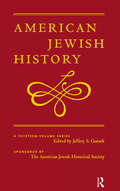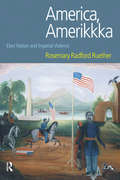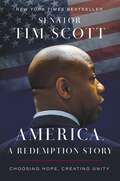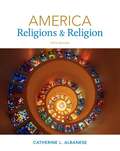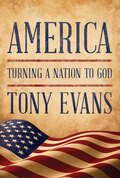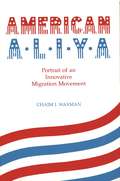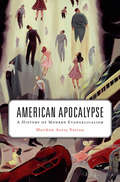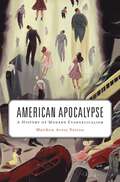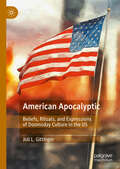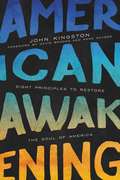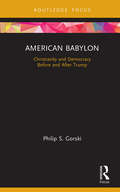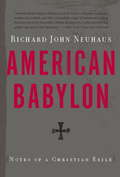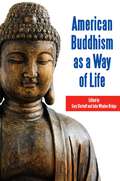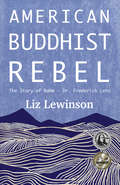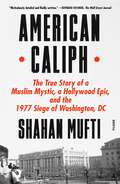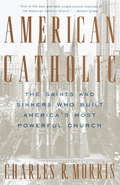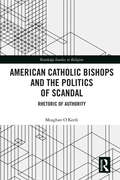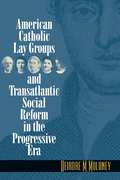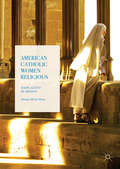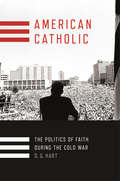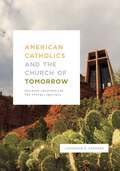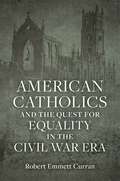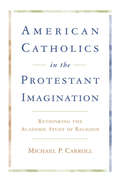- Table View
- List View
America, American Jews, and the Holocaust: American Jewish History (American Jewish History #4)
by Jeffrey S. GurockThis volume incorporates studies of the persecution of the Jews in Germany, the respective responses of the German-American Press and the American-Jewish Press during the emergence of Nazism, and the subsequent issues of rescue during the holocaust and policies towards the displaced.
America, Amerikkka: Elect Nation and Imperial Violence (Religion and Violence)
by Rosemary Radford RuetherAmerica views itself as a nation inhabiting a "promised land" and enjoying a favoured relation with God. This view of unique election has been coupled with racial exclusivism and the marginalization of non-white citizens.America, Amerikkka traces the historical and ideological patterns behind America’s sense of itself. In its examination of America’s "chosenness", the book ranges across the doctrine of the "rights of man" in the 18th and 19th centuries, the role of America in the twentieth century as "global policeman", and the enforcement of neo-colonial relations over the "third world". The volume argues for a vision of global relations between peoples based on justice and mutuality, rather than hegemonic dominance.
America, a Redemption Story: Choosing Hope, Creating Unity
by Senator Tim ScottThe American Dream isn&’t a thing of the past, but a miracle of the present.Now more than ever it&’s easy to focus on the divisions that plague our nation. It may seem as if our best days are behind us, but bestselling author and senator Tim Scott believes we have yet to realize the fullness of our identity. We are in the midst of a story that&’s still unfolding. And beautiful opportunities await.In this powerful memoir, Scott recounts formative events of his life alongside the inspiring stories of other Americans who have risen above hardship and embodied the values that make our nation great. Together these personal and inspirational accounts call readers to embracethe mountaintops as well as the valleys on the journey to a more perfect union;a path marked by optimism, hope, and resolve; anda future characterized by endurance, unity, and strength.Both a clear-eyed reckoning with our nation&’s failures and an ode to its accomplishments, America, a Redemption Story issues a clarion call for all of us to rise courageously to the greatness within our reach.
America: Land I Love
by Kurt A. GrussendorfThe people were living in the New World long before the Europeans discovered it. Over four thousand years ago, after the great Flood of Noah's day, God caused the people of the world to speak many different languages and scattered them from the tower of Babel "upon the face of all the earth."
America: Religions and Religion (5th Edition)
by Catherine L. AlbaneseAlbanese (emerita, comparative religions, U. of California--Santa Barbara) introduces students to the variety of religions in the US, and to the theories and practices of studying religion. She considerably shortened and revised the 2007 fourth edition to account for changes in classes and students, and for this fifth takes account of changes in the religious landscape since then--including findings from the 2010 census. She covers the original cast, new-made in America, patterns of expansion and contraction, and American religion and American identity. Among specific topics are tradition and change among Native Americans, the presence of Roman Catholicism, the protestant churches and the mission mind, African American religion and nationhood, 19th-century new religions, Eastern peoples and Eastern religions, and many centers meeting.
America: Turning a Nation to God
by Tony EvansHow can YOU help bring hope to our nation?At a time when it seems that our nation is toppling over—morally, culturally, economically, and politically—you may be asking this question: Is there any hope for America?Dr. Tony Evans says YES.In America: Turning a Nation to God, Dr. Evans helps Christians understand that at the core, America's problems are spiritual. And, God and His rule are America's only hope. As His people, God is calling us to return to Him in humility and repentance, to submit to His rule and authority. Only as we commit to doing so, individually and collectively, will we realize that hope.We hold within the collective body of Christ not only the power but also the capacity to put our country back on the path of ascendancy. This straight-forward teaching, when embraced by believers in our nation, will usher in the greatest revival in American history.
America: Turning a Nation to God
by Tony EvansHow can YOU help bring hope to our nation?At a time when it seems that our nation is toppling over—morally, culturally, economically, and politically—you may be asking this question: Is there any hope for America?Dr. Tony Evans says YES.In America: Turning a Nation to God, Dr. Evans helps Christians understand that at the core, America's problems are spiritual. And, God and His rule are America's only hope. As His people, God is calling us to return to Him in humility and repentance, to submit to His rule and authority. Only as we commit to doing so, individually and collectively, will we realize that hope.We hold within the collective body of Christ not only the power but also the capacity to put our country back on the path of ascendancy. This straight-forward teaching, when embraced by believers in our nation, will usher in the greatest revival in American history.
American Aliya: Portrait of an Innovative Migration Movement
by Chaim I. WaxmanThe major focus is on the who, when, and where of American immigration to Israel, but it is the "why" of this aliya which constitutes the core of the book. Waxman analyzes the relationship between Zionism, aliya, and the Jewish experience. Chapters include "Zion in Jewish culture," a synopsis of Zionism through the years, and "American Jewry and the land of Israel in the Eighteenth and Nineteenth Centuries," an account of proto-Zionist ideas and movements in early America. Chaim I. Waxman delivers a broad analysis of the phenomenon of American migration to Israel - aliya. Working within the context of the sociology of migration, Waxman provides primary research into a variety of dimensions of this movement and demonstrates the inadequacy of current migration theories to characterize aliya.
American Apocalypse: A History of Modern Evangelicalism
by Matthew Avery SuttonThe first comprehensive history of modern American evangelicalism to appear in a generation, American Apocalypse shows how a group of radical Protestants, anticipating the end of the world, paradoxically transformed it. Matthew Avery Sutton draws on extensive archival research to document the ways an initially obscure network of charismatic preachers and their followers reshaped American religion, at home and abroad, for over a century. Perceiving the United States as besieged by Satanic forces: communism and secularism, family breakdown and government encroachment, Billy Sunday, Charles Fuller, Billy Graham, and others took to the pulpit and airwaves to explain how Biblical end-times prophecy made sense of a world ravaged by global wars, genocide, and the threat of nuclear extinction. Believing Armageddon was nigh, these preachers used what little time was left to warn of the coming Antichrist, save souls, and prepare the nation for God's final judgment. By the 1980s, President Ronald Reagan and conservative Republicans appropriated evangelical ideas to create a morally infused political agenda that challenged the pragmatic tradition of governance through compromise and consensus. Following 9/11, the politics of apocalypse continued to resonate with an anxious populace seeking a roadmap through a world spinning out of control. Premillennialist evangelicals have erected mega-churches, shaped the culture wars, made and destroyed presidential hopefuls, and brought meaning to millions of believers. Narrating the story of modern evangelicalism from the perspective of the faithful, Sutton demonstrates how apocalyptic thinking continues to exert enormous influence over the American mainstream today.
American Apocalypse: A History of Modern Evangelicalism
by Matthew Avery SuttonIn the first comprehensive history of American evangelicalism to appear in a generation, Matthew Sutton shows how charismatic Protestant preachers, anticipating the end of the world, paradoxically transformed it. Narrating the story from the perspective of the faithful, he shows how apocalyptic thinking influences the American mainstream today.
American Apocalyptic: Beliefs, Rituals, and Expressions of Doomsday Culture in the US
by Juli L. GittingerIn this book, Juli Gittinger argues that America’s fascination (obsession?) with the apocalypse is a synthesis of religion, popular culture, and politics in a way that is particular to the US and consonant with mythological-historical narratives of America. As a result, we can identify American apocalypticism as a sort of religion in itself that is closely tied to “civil religion,” that has a worldview and rituals that create identifiable communities and connects American mythology to apocalyptic anxieties. Gittinger discusses how various cultures and groups form as a result of this obsession, and that these communities form their own rituals and responses in various forms of “prepping” or survivalist practices. She lays out an argument for a broad eschatology prevalent in the US that extends beyond traditional religious designations to form an apocalyptic worldview that is built into our narrative as a country, as well as furthered by popular culture and media’s contributionto apocalyptic anxieties. Subsequently, Gittinger uses case studies of apocalyptic events—current or speculative—that reveal how our anxieties about the end of the world (as we know it) inform our culture, as well as religious narratives that emerge from such crises.
American Awakening: Eight Principles to Restore the Soul of America
by John KingstonA healthy and united America--perhaps a country more united than it has ever been--is truly possible, and it starts with us. John Kingston draws on wisdom from history, science, faith, and culture, along with his own experiences, to offer eight principles for discovering purpose, meaning, and true community. We live in the greatest peace and prosperity that the world has ever known, but Americans are feeling more division, isolation, depression, and despair than ever before. These are issues of the soul. We seem unable to find purpose and meaning. We can't find "the life that is truly life"--a vibrant and purpose-filled way of living best experienced together.From his youth, Kingston has always carried a vision for a free and united America. With an approachable and conversational style, as well as a dash of humor, Kingston draws on a diverse and compelling collection of wisdom--the parables of the Bible and the philosophy of Aristotle, the legacy of Nelson Mandela and the speeches of Abraham Lincoln, the songs of Bruce Springsteen and current studies from the best neuro and social scientists today--to remind us that there is no "them," there is only us, and we're in this together.In American Awakening, Kingston offers eight timeless principles for breaking through this darkness and despair and cultivating a radical togetherness, both here in this country and around the globe. You'll discover the profound impact of:In-person connectionMaking more from lessDiscovering purposeRedeeming adversityResponding instead of reactingFinding your unique sense of belongingWherever you find yourself politically or spiritually, a healthy and united America starts with you. Join the Awakening movement and let's rediscover who we are--together.
American Babylon: Christianity and Democracy Before and After Trump (Routledge Focus on Religion)
by Philip S. GorskiWhy did 81 percent of white evangelicals vote for Donald Trump in 2016? And what does this tell us about the relationship between Christianity and democracy in the United States? American Babylon places our present political moment against a deep historical backdrop. In Part I the author traces the development of democratic institutions from Ancient Greece through to the American Revolution and of Christian political theology from Augustine to Falwell. Part II charts the decline of democratic governance within American churches; explains the capture of evangelical Christianity by the Republican Party; and denounces the fateful embrace between white Christian nationalists and right-wing populists that culminated in Trump’s victory. An accessible and timely book, American Babylon is essential reading for those concerned with the vexed relationship of religion and politics in the United States, including students and scholars in the fields of divinity, history, political science, religious studies, and sociology.
American Babylon: Notes of a Christian Exile
by Richard John NeuhausChristians are by their nature a people out of place. Their true home is with God; in civic life, they are alien citizens "in but not of the world. " InAmerican Babylon, eminent theologian Richard John Neuhaus examines the particular truth of that ambiguity for Catholics in America today. Neuhaus addresses the essential quandaries of Catholic life-assessing how Catholics can keep their heads above water in the sea of immorality that confronts them in the world, how they can be patriotic even though their true country is not in this world, and how they might reconcile their duties as citizens with their commitment to God. Deeply learned, frequently combative, and always eloquent,American Babylonis Neuhaus'smagnum opus-and will be essential reading for all Christians.
American Buddhism as a Way of Life (SUNY series in Buddhism and American Culture)
by John Whalen-Bridge Gary StorhoffThe US seems to be becoming a Buddhist country. Celebrity converts, the popularity of the Dalai Lama, motifs in popular movies, and mala beads at the mall indicate an increasing inculcation of Buddhism into the American consciousness, even if a relatively small percentage of the population actually describe themselves as Buddhists. This book looks beyond the trendier manifestations of Buddhism in America to look at distinctly American Buddhist ways of life—ways of perceiving and understanding. John Whalen-Bridge and Gary Storhoff have organized this unique collection in accordance with the Buddhist concept of the Three Jewels: the Buddha, the Dharma, and the Sangha. The Buddha section discusses the two key teachers who popularized Buddhism in America: Alan Watts and D. T. Suzuki and the particular kinds of spirituality they proclaimed. The Dharma section deals with how Buddhism can enlighten current public debates and a consideration of our national past with explorations of bioethics, abortion, end-of-life decisions, and consciousness in late capitalism. The final section on the Sangha, or community of believers, discusses how Buddhist communities both formal and informal have affected American society with chapters on family life, Nisei Buddhists, gay liberation, and Zen gardens.
American Buddhist Rebel: The Story of Rama - Dr. Frederick Lenz
by Liz LewinsonWinner of the 2016 Eric Hoffer Award, this acclaimed biography of the brilliant, controversial Buddhist teacher Rama - Dr. Frederick Lenz (1950 - 1998) is this free-spirited adventure of a wild, sports jock teenager who transforms into an iconoclastic, innovative leader, boundary breaking is de rigueur as reported by the 100+ students and colleagues interviewed by author Liz Lewinson. Meditation, the empowerment of women and career as practice are but three of the core teachings covered in this book. Dr. Lenz ran into opposition, of course, but he kept his priorities straight. When he visited Nepal at age 19, he encountered an aged monk who informed him that he was a lineage bearer. He was to revive an ancient school of enlightenment. He was to find his many past life students and help them achieve joyous enlightenment in this life or at least set them securely on the path. He was to do this in the West, using Western means. In the East, centuries-old traditions maintain meditative pathways to enlightenment. In the West, facing a blank canvas, Dr. Lenz found new ways to build mental/meditative prowess through careers such as computer science, visits to American "places of power," knowledge about real gender equilibrium, movies, music, and dance. He taught these skills to American students and observed their success. When you read this fast-paced biography, you enter the inner teaching circle of baseline American Buddhism. "This fascinating biography captures the wisdom of a genuine, compelling teacher who combined absolute miracles with humor, fun, and adventure. When you read this fast-paced book, you feel you are there, learning and transforming. This is an original and exciting read." -- Lynn Andrews, author of The Medicine Woman Series
American Caliph: The True Story of a Muslim Mystic, a Hollywood Epic, and the 1977 Siege of Washington, DC
by Shahan MuftiOne of Publishers Weekly's best nonfiction books of 2022The riveting true story of America’s first homegrown Muslim terror attack, the 1977 Hanafi siege of Washington, D.C. Late in the morning of March 9, 1977, seven men stormed the Washington, D.C., headquarters of B’nai B’rith International, the largest and oldest Jewish service organization in America. The heavily armed attackers quickly took control of the building and held more than a hundred employees of the organization hostage inside. A little over an hour later, three more men entered the Islamic Center of Washington, the country’s largest and most important mosque, and took hostages there. Two others subsequently penetrated the District Building, a few hundred yards from the White House. When a firefight broke out, a reporter was killed, and Marion Barry, later to become mayor of Washington, D.C., was shot in the chest. The deadly standoff brought downtown Washington to a standstill. The attackers belonged to the Hanafi Movement, an African American Muslim group based in D.C. Their leader was a former jazz drummer named Hamaas Abdul Khaalis, who had risen through the ranks of the Nation of Islam before feuding with the organization’s mercurial chief, Elijah Muhammad, and becoming a spiritual authority to Kareem Abdul-Jabbar. Like Malcolm X, Khaalis had become sharply critical of the Nation’s unorthodox style of Islam. And, like Malcolm X, he paid dearly for his outspokenness: In 1973, followers of the Nation murdered seven Hanafis at their headquarters, including several members of Khaalis’s family. When they took hostages in 1977, one of the Hanafis’ demands was for the murderers, along with Muhammad Ali and Elijah’s son, to be turned over to the group to face justice. They also demanded that the American premiere of Mohammad: Messenger of God—an epic about the life of the prophet Muhammad financed and supported by the Libyan leader Muammar Gadhafi—be canceled and the film destroyed. The lives of 149 hostages hung in the balance, and the United States’ fledgling counterterrorism forces—as yet untested—would have to respond. Shahan Mufti’s American Caliph gives a full account of the largest ever hostage taking on American soil and of the man who masterminded it. Informed by extensive archival research and access to hundreds of declassified FBI files, American Caliph is a riveting true-crime story that sheds new light on the disarray of the 1970s and its ongoing reverberations.
American Catholic
by Charles Morris"A cracking good story with a wonderful cast of rogues, ruffians and some remarkably holy and sensible people." --Los Angeles Times Book ReviewBefore the potato famine ravaged Ireland in the 1840s, the Roman Catholic Church was barely a thread in the American cloth. Twenty years later, New York City was home to more Irish Catholics than Dublin. Today, the United States boasts some sixty million members of the Catholic Church, which has become one of this country's most influential cultural forces.In American Catholic: The Saints and Sinners Who Built America's Most Powerful Church, Charles R. Morris recounts the rich story of the rise of the Catholic Church in America, bringing to life the personalities that transformed an urban Irish subculture into a dominant presence nationwide. Here are the stories of rogues and ruffians, heroes and martyrs--from Dorothy Day, a convert from Greenwich Village Marxism who opened shelters for thousands, to Cardinal William O'Connell, who ran the Church in Boston from a Renaissance palazzo, complete with golf course. Morris also reveals the Church's continuing struggle to come to terms with secular, pluralist America and the theological, sexual, authority, and gender issues that keep tearing it apart. As comprehensive as it is provocative, American Catholic is a tour de force, a fascinating cultural history that will engage and inform both Catholics and non-Catholics alike."The best one-volume history of the last hundred years of American Catholicism that it has ever been my pleasure to read. What's appealing in this remarkable book is its delicate sense of balance and its soundly grounded judgments." --Andrew GreeleyFrom the Trade Paperback edition.
American Catholic Bishops and the Politics of Scandal: Rhetoric of Authority (Routledge Studies in Religion)
by Meaghan O'KeefeThis book explores the rhetoric and public communication of the Catholic Church in the United States in the wake of the sexual abuse scandals and offers a demonstration of how large organizations negotiate a loss of public trust while retaining political power. While the Catholic Church remains a major political force in the United States, recent scandals have undoubtedly had an adverse effect on both its reputation and moral authority. This has been exacerbated by the public responses of Catholic clergy, which have often left supporters of the Church, let alone critics, profoundly unsatisfied. Drawing on documents – voting guides, pastoral letters, sermons, press releases, and other materials – issued by the United States Conference of Catholic Bishops (USCCB) as well as American nuns, the book explores Catholic political statements issued after the sexual abuse crises entered the public consciousness. Using approaches from linguistics and rhetoric, it analyses how these statements compare to similar materials issued before this time. This comparison demonstrates that for the American Catholic Church persuasion is less important than maintaining the impression that there has been no loss of authority. This is a timely study of the Catholic Church’s handling of the recent revelations of abuse within the Church. As such, it will be of keen interest to scholars of religious rhetoric, contemporary Catholicism, linguistics, rhetoric, communication, and religious studies.
American Catholic Lay Groups and Transatlantic Social Reform in the Progressive Era
by Deirdre M. MoloneyTracing the development of social reform movements among American Catholics from 1880 to 1925, Deirdre Moloney reveals how Catholic gender ideologies, emerging middle-class values, and ethnic identities shaped the goals and activities of lay activists. Rather than simply appropriate American reform models, ethnic Catholics (particularly Irish and German Catholics) drew extensively on European traditions as they worked to establish settlement houses, promote temperance, and aid immigrants and the poor. Catholics also differed significantly from their Protestant counterparts in defining which reform efforts were appropriate for women. For example, while women played a major role in the Protestant temperance movement beginning in the mid-nineteenth century, Catholic temperance remained primarily a male movement in America. Gradually, however, women began to carve out a significant role in Catholic charitable and reform efforts. <P>The first work to highlight the wide-ranging contributions of the Catholic laity to Progressive-era reform, the book shows how lay groups competed with Protestant reformers and at times even challenged members of the Catholic hierarchy. It also explores the tension that existed between the desire to demonstrate the compatibility of Catholicism with American values and the wish to preserve the distinctiveness of Catholic life.
American Catholic Women Religious: Radicalized by Mission
by Donna Maria MosesThis book depicts the significant role played by American Catholic Women Religious in the broader narratives of modern American history and the history of the Catholic Church. The book is a guide to fifty foreign missions founded by Dominican and Maryknoll Sisters in the twentieth century. Sister Donna Moses examines root causes for the radical political stances taken by American Catholic Women Religious in the latter half of the century and for the conservative backlash that followed. The book identifies key events that contributed to the present state of division within the American Catholic Church and describes current efforts to engage in dynamic dialogue.
American Catholic: The Politics of Faith During the Cold War (Religion and American Public Life)
by D. G. HartAmerican Catholic places the rise of the United States' political conservatism in the context of ferment within the Roman Catholic Church. How did Roman Catholics shift from being perceived as un-American to emerging as the most vocal defenders of the United States as the standard bearer in world history for political liberty and economic prosperity? D. G. Hart charts the development of the complex relationship between Roman Catholicism and American conservatism, and shows how these two seemingly antagonistic ideological groups became intertwined in advancing a certain brand of domestic and international politics. Contrary to the standard narrative, Roman Catholics were some of the most assertive political conservatives directly after World War II, and their brand of politics became one of the most influential means by which Roman Catholicism came to terms with American secular society. It did so precisely as bishops determined the church needed to update its teaching about its place in the modern world. Catholics grappled with political conservatism long before the supposed rightward turn at the time of the Roe v. Wade decision in 1973.Hart follows the course of political conservatism from John F. Kennedy, the first and only Roman Catholic president of the United States, to George W. Bush, and describes the evolution of the church and its influence on American politics. By tracing the roots of Roman Catholic politicism in American culture, Hart argues that Roman Catholicism's adaptation to the modern world, whether in the United States or worldwide, was as remarkable as its achievement remains uncertain. In the case of Roman Catholicism, the effects of religion on American politics and political conservatism are indisputable.
American Catholics and the Church of Tomorrow: Building Churches for the Future, 1925–1975
by Catherine R. OsborneIn the mid-twentieth century, American Catholic churches began to shed the ubiquitous spires, stained glass, and gargoyles of their European forebears, turning instead toward startling and more angular structures of steel, plate glass, and concrete. But how did an institution like the Catholic Church, so often seen as steeped in inflexible traditions, come to welcome this modernist trend? Catherine R. Osborne’s innovative new book finds the answer: the alignment between postwar advancements in technology and design and evolutionary thought within the burgeoning American Catholic community. A new, visibly contemporary approach to design, church leaders thought, could lead to the rebirth of the church community of the future. As Osborne explains, the engineering breakthroughs that made modernist churches feasible themselves raised questions that were, for many Catholics, fundamentally theological. Couldn’t technological improvements engender worship spaces that better reflected God's presence in the contemporary world? Detailing the social, architectural, and theological movements that made modern churches possible, American Catholics and the Churches of Tomorrow breaks important new ground in the history of American Catholicism, and also presents new lines of thought for scholars attracted to modern architectural and urban history.
American Catholics and the Quest for Equality in the Civil War Era
by Robert Emmett CurranRobert Emmett Curran’s masterful treatment of American Catholicism in the Civil War era is the first comprehensive history of Roman Catholics in the North and South before, during, and after the war. Curran provides an in-depth look at how the momentous developments of these decades affected the entire Catholic community, including Black and indigenous Americans. He also explores the ways that Catholics contributed to the reshaping of a nation that was testing the fundamental proposition of equality set down by its founders. Ultimately, Curran concludes, the revolution that the war touched off remained unfinished, indeed was turned backward, in no small part by Catholics who marred their pursuit of equality with a truncated vision of who deserved to share in its realization.
American Catholics in the Protestant Imagination: Rethinking the Academic Study of Religion
by Michael P. CarrollMichael P. Carroll argues that the academic study of religion in the United States continues to be shaped by a "Protestant imagination" that has warped our perception of the American religious experience and its written history and analysis.In this provocative study, Carroll explores a number of historiographical puzzles that emerge from the American Catholic story as it has been understood through the Protestant tradition. Reexamining the experience of Catholicism among Irish immigrants, Italian Americans, Acadians and Cajuns, and Hispanics, Carroll debunks the myths that have informed much of this history.Shedding new light on lived religion in America, Carroll moves an entire academic field in new, exciting directions and challenges his fellow scholars to open their minds and eyes to develop fresh interpretations of American religious history.
